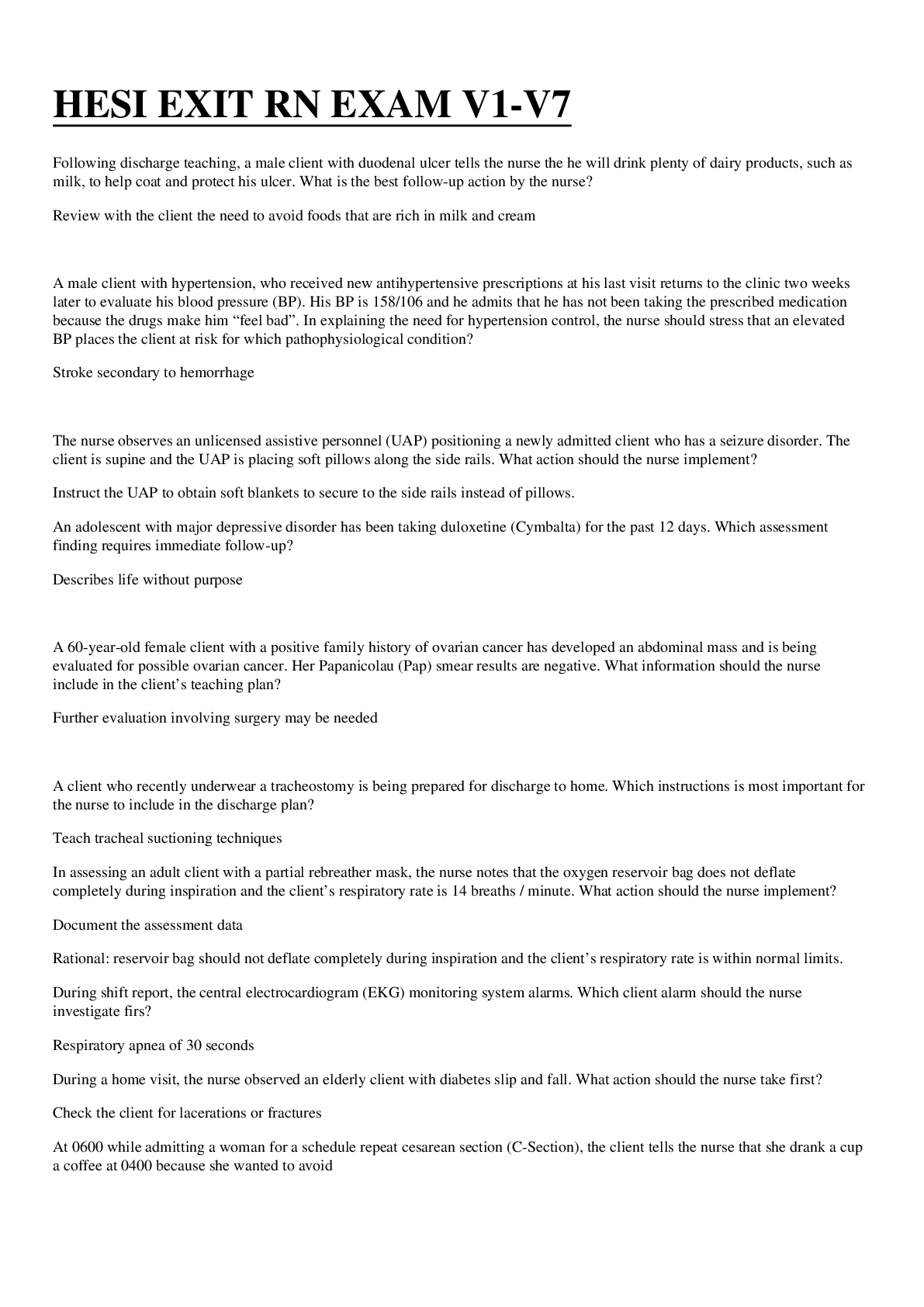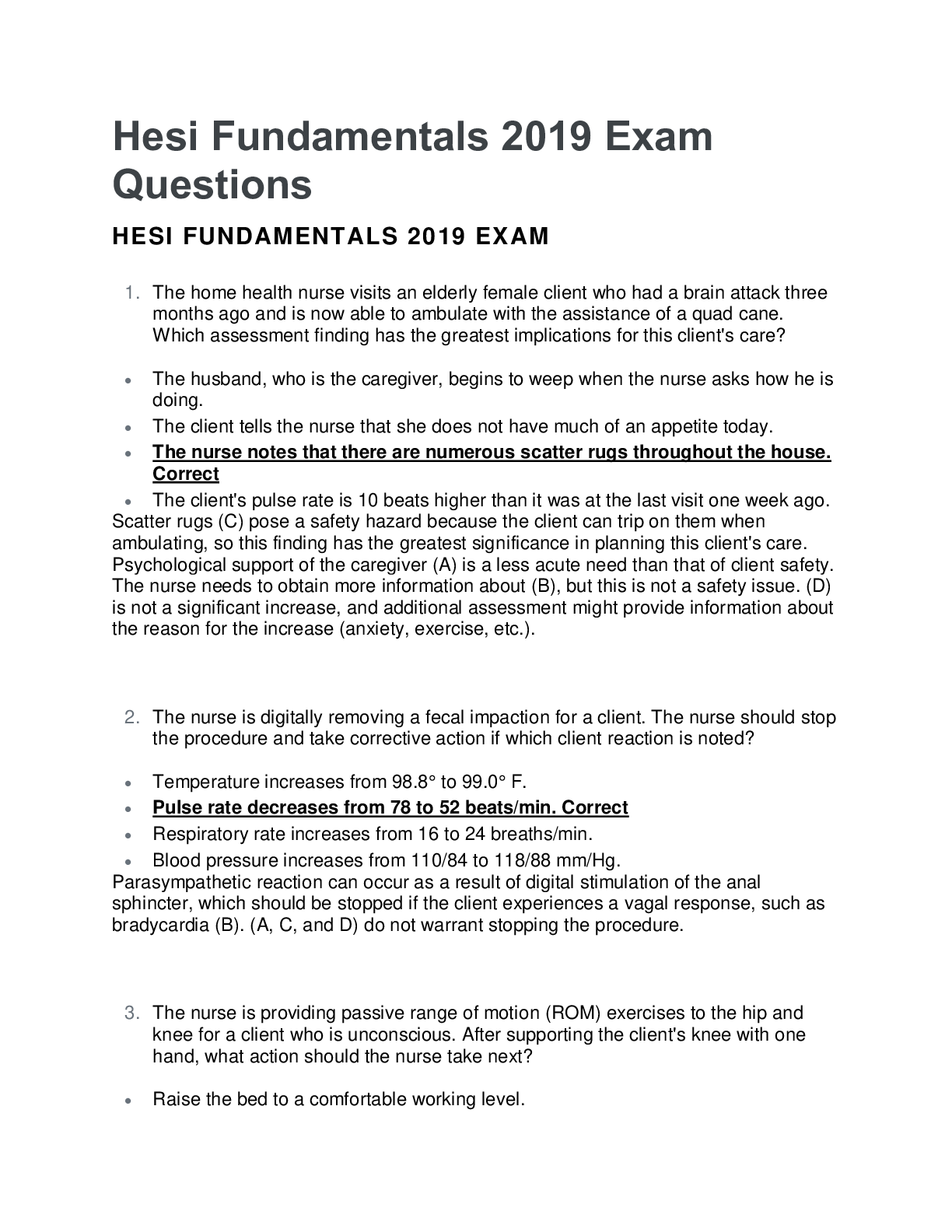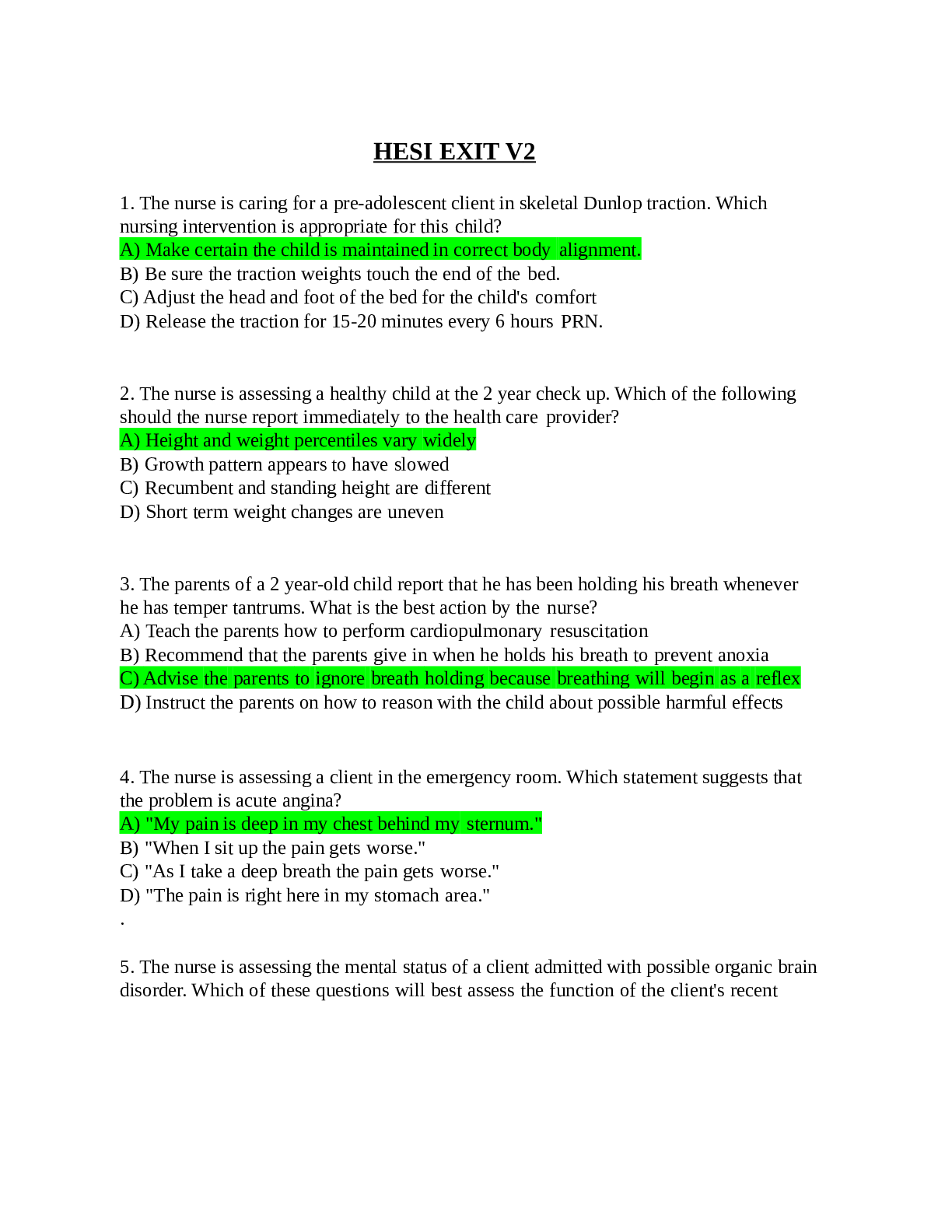HESI A2 AP V 1 with Answers
Document Content and Description Below
HESI A2 AP V 1 with Answers HESI A2 AP V 1 What is the Respiratory center of the nervous system? a. Medulla Oblongata b. Hypothalamus c. Hypocamgus d. Cerebellum 2. Which of the following is a structu... re found in the upper respiratory? a. Lungs b. Bronchi c. Alveoli d. Pharynx 3. A person who has damage to their ulnar nerve will have decreases sensation in a. Leg b. Torso c. Arm d. Neck 4. Which bone dose not articulate with any other bone? a. Os coxa b. Navicular c. Hyoid d. Clavicle 5. Which of the following statements best describe endocrine glands? a. They secrete chemicals into the blood b. The secrete their products into duct c. The release their secretions on an internal or external surface d. The include the salivary gland 6. Diet is important because bone are storage places for a. Sodium and potassium b. Calcium and potassium c. Phosphorous and zinc d. Calcium and phosphorous 7. Which organ is part of both the male reproductive system and the urinary system? a. Epididymis b. Urethra c. Testis d. Ureter 8. Ligaments provides with connection? a. Muscle to bone b. Muscle to muscle c. Bone to bone d. Viscera to bone 9. What structure conduct urine from the kidney to the urinary bladder? a. Urethra b. Renal pelvis c. Ureter d. Renal column 10. Anaerobic respiration can lead to a burning sensation caused by with molecule? a. Creatine-phosphate b. Adenosine triphosphate (ATP) c. Lactic acid d. Adenosine diphosphate 11. As part of the negative feedback system, which type of cell is stimulated to resorb bone matrix in response to a decrease in calcium in the blood? a. Chondrocytes b. Osteocytes c. Chondroblasts d. Osteoclasts 12. Sweat on the skin’s surface cools the body through which process? a. Facilltated diffustion b. Evaporation c. Osmosis d. Filration 13. When assessing a female client who describes herself as a vegetarian in the nurse notes that she has an unusual skin color. The nurse should ask the client if she has eaten large amount of: a) rice and egg b) tumps and beets c) spinach and muster greens d) carrot and squash. 14. Which hand position describes an anatomical position of a person who is standing erect with feet forward? a. Palms of the hand facing laterally b. Palms of the hand facing anteriorly c. Palms of the hand face posteriorly d. Palms of the hand facing medially 15. Which structure is a ball and socket joint? a. Ankle b. Knee c. Shoulder d. Elbow 16. Which anatomical structure houses the malleus, incus, and stapes? a. Mouth b. Lungs c. Skull ear 17. What are like cells grouped together called? a. An organ b. A tissue c. A system d. A membrane 18. The pulse point located behind the knee is palpated over which artery? a. Popliteal b. Dorsal Pedi’s c. Femoral d. Posterior tibial 19. Ceruminous glands secrete a. Ear wax b. Keratin c. Mucus d. Sebum 20. What type of synovial joint is the elbow? a. Hinge b. Pivot c. Ball and socket d. Saddle 21. What occurs when the sympathetic nervous system is stimulated? Increased a. Uterine activity b. Cardiac output c. Gastrointestinal activity d. Pancreatic activity 22. Where does digestion begin in the digestive system? a. Oral cavity b. Small intestine c. Esophagus d. Stomach 23. Which structure regulates the transport of substances in and out of a cell? a. The cell membrane b. The cell’s cytoplasm c. The cell wall d. The nuclear membrane 24. The mediastinum is located within which cavity? a. Pericardial b. Abdominal c. Thoracic d. Pelvic 25. What is the effect of serotonin, a neurotransmitter? a. Regulates blood pressure and heart rate b. Regulates pituitary hormone secretion c. Involved with mood, anxiety and sleep d. Helps coordinate voluntary motor function 26. What is the response of cells in the collecting tubules in the nephrons when antidiuretic hormone AHD is secreted? a. The tubules become impermeable to water b. Serum potassium retention increases c. Large quantities of dilute urine are formed d. Water is reabsorbed from the urinary filtrate 27. What is the function of the thrombocytes (platelets)? a. Defend against infection b. Play role in blood clotting c. From connective tissue d. Transport respiratory gases 28. Which muscle of the quadriceps femoris group lies on the slide surface of the lower extremity? a. Rectus femoris b. Vastus lateralis c. Gastrocnemius d. Anterior tibialis 29. Which structure is located on the sternum a. Hyoid bone b. Ossa Cozae c. Sesamoid bone d. Xiphoid process [Show More]
Last updated: 2 years ago
Preview 1 out of 6 pages

Buy this document to get the full access instantly
Instant Download Access after purchase
Buy NowInstant download
We Accept:

Reviews( 0 )
$11.50
Can't find what you want? Try our AI powered Search
Document information
Connected school, study & course
About the document
Uploaded On
Mar 09, 2021
Number of pages
6
Written in
Additional information
This document has been written for:
Uploaded
Mar 09, 2021
Downloads
0
Views
52















